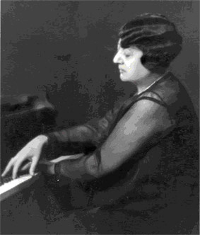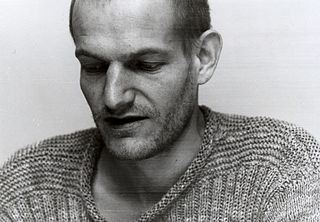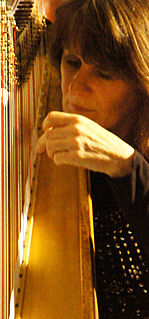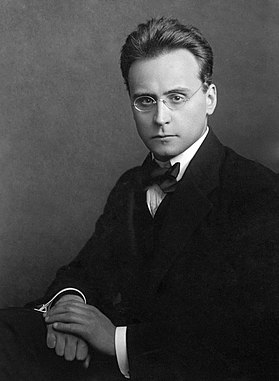 W
WAlban Maria Johannes Berg was an Austrian composer of the Second Viennese School. His compositional style combined Romantic lyricism with the twelve-tone technique. Although he left a relatively small oeuvre, he is remembered as one of the most important composers of the 20th century for his expressive style encompassing "entire worlds of emotion and structure".
 W
WFriedrich Cerha is an Austrian composer, conductor and music educator.
 W
WCamilla Frydan, birthname Herzl, married name Friedmann, pseudonym Herzer, (1887–1949) was an Austrian pianist, soubrette singer, composer and song writer. She performed in operettas and revues in Vienna and Berlin before she was forced to emigrate to the United States in 1938. She settled in New York where she produced hundreds of melodious numbers which were published by her Empress Music Publishing.
 W
WAnton Karas was an Austrian zither player and composer, best known for his internationally famous 1948 soundtrack to Carol Reed's The Third Man. His association with the film came about as a result of a chance meeting with its director. The success of the film and the enduring popularity of its theme song changed Karas' life.
 W
WAnna Justine Mahler was an Austrian sculptor.
 W
WFritz Mahler was an Austrian conductor.
 W
WWolfgang Mitterer is an Austrian composer and musician.
 W
WKurt Overhoff was an Austrian conductor and composer.
 W
WFranz Schmidt, also Ferenc Schmidt was an Austro-Hungarian composer, cellist and pianist.
 W
WArnold Schoenberg or Schönberg was an Austrian-born composer, music theorist, teacher, writer, and painter. He is widely considered one of the most influential composers of the 20th century. He was associated with the expressionist movement in German poetry and art, and leader of the Second Viennese School. As a Jewish composer, Schoenberg was targeted by the Nazi Party, which labeled his works as degenerate music and forbade them from being published. He emigrated to the United States in 1933, becoming an American citizen in 1941.
 W
WFranz Schreker was an Austrian composer, conductor, teacher and administrator. Primarily a composer of operas, Schreker developed a style characterized by aesthetic plurality, timbral experimentation, strategies of extended tonality and conception of total music theatre into the narrative of 20th-century music.
 W
WMonika Stadler is an Austrian harpist and composer. She resides in Vienna.
 W
WRobert Elisabeth Stolz was an Austrian songwriter and conductor as well as a composer of operettas and film music.
 W
WJohann Strauss III was an Austrian composer whose father was Eduard Strauss, whose uncles were Johann Strauss II and Josef Strauss, and whose grandfather was Johann Strauss I. He was unofficially entrusted with the task of upholding his family's tradition after the dissolution of the Strauss Orchestra by his father in 1901. His talents were not fully realized during his lifetime as musical tastes had changed in the Silver Age with more popular composers such as Franz Lehár and Oscar Straus dominating the Viennese musical scene with their operettas, although his uncle, Johann Strauss II, supervised his development as a musician, a fact disputed by Eduard Strauss.
 W
WCarlo Sigmund Taube was a pianist, composer, conductor, and victim of the Holocaust.
 W
WDr. Victor Urbancic or Viktor Ernest Johann von Urbantschitsch was an Austrian composer, conductor, teacher and music scholar from Vienna. He emigrated to Iceland in 1938. His wife, Melitta, came from a Jewish family. Urbancic stayed for the second half of his life in Iceland and had a big influence on the music development in the country at the time.
 W
WAnton Friedrich Wilhelm von Webern was an Austrian composer and conductor.. Along with his mentor Arnold Schoenberg and his colleague Alban Berg, Webern was in the core of those in the circle of the Second Viennese School, including Theodor W. Adorno, Heinrich Jalowetz, and Ernst Krenek. As an exponent of atonality and twelve-tone technique, Webern exerted influence on contemporaries Luigi Dallapiccola, Křenek, and even Schoenberg himself. As a tutor, Webern guided and variously influenced Arnold Elston, Frederick Dorian, Matty Niël, Fré Focke, Karl Amadeus Hartmann, Philipp Herschkowitz, René Leibowitz, Humphrey Searle, Leopold Spinner, and Stefan Wolpe.
 W
WAlexander Zemlinsky or Alexander von Zemlinsky was an Austrian composer, conductor, and teacher.